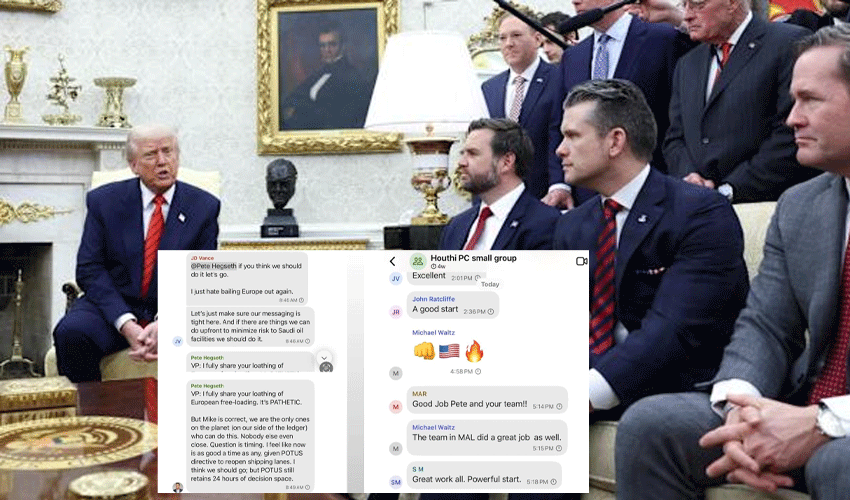Imagine waking up, grabbing your phone, and—boom—you’re in a secret government chat where top US officials are casually discussing classified war plans.
Sounds like a scene from a spy thriller, right? Well, that’s exactly what happened to The Atlantic‘s editor-in-chief, Jeffrey Goldberg.

Thanks to a massive blunder, he got added to a private Signal group where senior Trump officials were literally planning strikes on Yemen’s Houthi rebels. Now, Washington is in full meltdown mode, with lawmakers demanding answers and experts calling it one of the biggest intelligence screw-ups ever.

How Did This Even Happen?
So, here’s the tea: Goldberg says he was mistakenly added to a Signal chat named “Houthi PC small group” on March 13. And guess who was in there? Heavyweights like VP JD Vance, Defense Secretary Pete Hegseth, CIA Director John Ratcliffe, and National Security Adviser Mike Waltz.
At first, Goldberg thought it had to be some kind of joke. But when the messages started detailing strike targets, weapons deployment, and exact timing for an attack on the Houthis, he realized—nah, this was real. Two days later, on March 15, the US actually launched airstrikes on Yemen’s capital, Sanaa. Yikes.
A Houthi spokesperson claimed the attacks killed at least 53 people. Meanwhile, the US is staying quiet on the numbers.
Washington is Losing Its Mind
The fallout? A total political circus. Senate Democratic Leader Chuck Schumer called it “one of the most shocking intelligence breaches in a very, very long time.” Meanwhile, Republican Senator Roger Wicker, who chairs the Armed Services Committee, confirmed they’re launching an investigation.
Over at the White House, Press Secretary Karoline Leavitt tried to play it cool, saying Trump “has full confidence in his national security team.” But when reporters asked Trump himself? Classic response:
“I don’t know anything about it. I don’t like The Atlantic anyway.”
Even the Government is Fighting Itself
If that wasn’t messy enough, the leaked chats also show Trump’s team beefing with each other. VP JD Vance was apparently stressing about the timing of the strikes and how they might mess with oil prices.
“Not sure the president realizes how inconsistent this is with his message on Europe right now,” Vance reportedly wrote. “There’s a real risk of a major oil price spike.”
But Defense Secretary Hegseth? Zero chill. He backed the move and threw shade at European allies, calling them freeloaders who rely on US military action without contributing enough.
“VP: I fully share your loathing of European free-loading. It’s PATHETIC,” Hegseth allegedly texted.
So, Who’s Getting Fired?
Great question. Right now, the National Security Council is scrambling, saying they’re “reviewing how an unauthorized number got into the chat.”
Meanwhile, Defense Secretary Hegseth is trying to act like it’s no big deal.
“Nobody was texting war plans, and that’s all I have to say about that,” he told reporters in Hawaii.
But Goldberg fired back fast: “That’s a lie. He was texting war plans.”
What’s Next?
Now that multiple investigations are coming, the Trump administration has a huge problem: how did top-secret military plans end up in a random group chat with a journalist? And if a reporter got in by accident, who else has seen US war plans?
This could go down as one of the biggest security fails ever. Congress is gearing up for hearings, and things are about to get messy. Stay tuned.
Biggest US Intelligence Leaks Ever
- 1971 – Pentagon Papers: Exposed US lies about the Vietnam War.
- 2010 – WikiLeaks: Released secret US military and diplomatic documents.
- 2013 – Snowden’s NSA Leaks: Revealed the US was spying on everyone.
- 2023 – Pentagon Leaks: A young Airman casually leaked top-secret Ukraine war docs on Discord.
History just added a new chapter.

